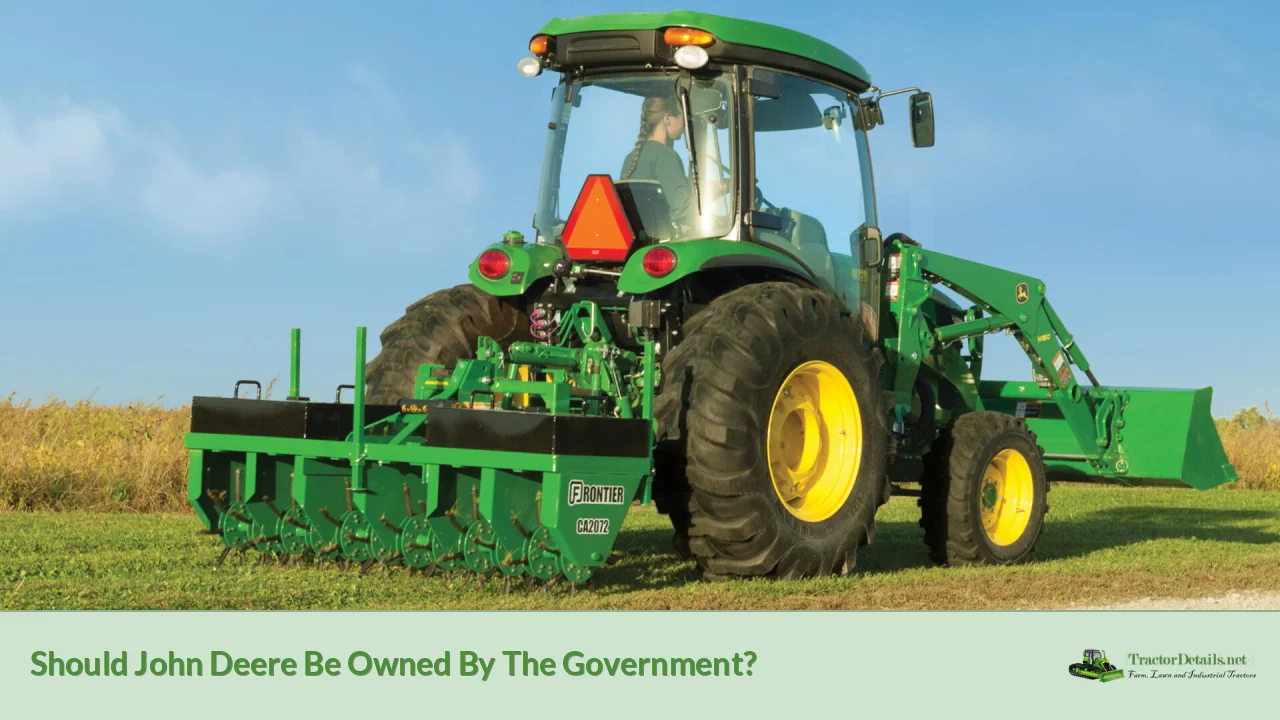The question of whether John Deere should be owned by the government is a complex issue that touches on various aspects of economics, agriculture, and public policy. John Deere, a leading manufacturer of agricultural machinery, has built a reputation over its long history for innovation and quality. However, its business practices, particularly regarding ownership rights and repairability of its equipment, have sparked significant debate among farmers, consumers, and policymakers.
Ownership of John Deere by the government could potentially reshape the agricultural landscape in the United States. The implications of such a move would affect not only the company itself but also farmers who rely on its equipment. This article explores the arguments for and against government ownership of John Deere, considering economic impacts, agricultural efficiency, public access to technology, and the potential for fostering innovation.
| Aspect | Details |
|---|---|
| Company Overview | Founded in 1837, John Deere is a major player in agricultural machinery. |
| Current Ownership | Publicly traded company with significant market influence. |
Economic Implications
The economic implications of government ownership of John Deere are substantial. On one hand, government ownership could lead to increased investment in agricultural technology and infrastructure. This could enhance productivity and efficiency in farming operations across the nation. Public ownership might also ensure that profits are reinvested into community development rather than distributed to shareholders.
On the other hand, nationalizing such a large corporation could lead to inefficiencies commonly associated with government-run enterprises. Historically, public ownership has sometimes resulted in bureaucratic red tape that stifles innovation and responsiveness to market demands. The potential for mismanagement and lack of competition could hinder the very advancements in technology that farmers need.
Moreover, there are concerns about how government control might affect pricing structures for farmers. If John Deere were owned by the government, prices for equipment could be manipulated to serve political ends rather than market needs. This could lead to increased costs for farmers or reduced access to necessary machinery.
Agricultural Efficiency
Government ownership could potentially improve agricultural efficiency by prioritizing public interest over profit margins. With a focus on sustainability and food security, a publicly owned John Deere might invest more heavily in environmentally friendly technologies and practices. This aligns with growing consumer demand for sustainable farming solutions.
However, efficiency can also be compromised under government control. Private companies like John Deere operate under competitive pressures that drive them to innovate continuously. If the company were government-owned, it might lack the same urgency to develop new technologies or improve existing products.
Additionally, farmers have expressed concerns about the right to repair their equipment. Currently, John Deere's policies limit farmers' ability to fix their own machinery without going through authorized dealers. If the government owned John Deere, it could enforce more favorable policies regarding repair rights. This would empower farmers and potentially reduce downtime during critical planting and harvesting seasons.
Public Access to Technology
One of the strongest arguments for government ownership revolves around public access to technology. Agricultural machinery is essential for modern farming operations; thus, ensuring equitable access is crucial. A government-owned John Deere could prioritize making advanced agricultural technologies available to all farmers, including small-scale operations that often struggle with high equipment costs.
This access could democratize farming technology and help level the playing field between large agribusinesses and smaller farms. By providing affordable machinery options or subsidies for equipment purchases, the government could support sustainable farming practices and local economies.
Conversely, there are concerns about how effectively a government-run entity can manage technological advancements. The private sector often drives innovation through competition; without this incentive, there may be less motivation to develop cutting-edge technologies that benefit farmers.
Fostering Innovation
Innovation is at the heart of agricultural advancement. Companies like John Deere invest heavily in research and development (R&D) to create new products that meet evolving farmer needs. Government ownership might not provide the same level of funding or focus on R&D as private companies do.
In addition to funding challenges, bureaucratic processes can slow down decision-making in government entities. This can hinder rapid responses to emerging agricultural challenges such as climate change or pest management.
However, public ownership could also foster collaboration between universities, research institutions, and farmers themselves. By aligning goals towards common public interests—such as food security or environmental sustainability—government ownership might create synergies that lead to innovative solutions.
Conclusion
The question of whether John Deere should be owned by the government involves weighing various factors: economic implications, agricultural efficiency, public access to technology, and fostering innovation. While there are compelling arguments on both sides of this debate, it ultimately hinges on broader societal values regarding agriculture's role in our economy and environment.
Balancing public interest with private enterprise's efficiencies is crucial as we consider how best to support farmers while ensuring sustainable practices in agriculture.
FAQs About Should John Deere Be Owned By The Government
- What are the benefits of government ownership of John Deere?
Government ownership may enhance public access to technology and prioritize sustainable practices. - How would farmers benefit from a publicly owned John Deere?
A publicly owned company could enforce better repair rights and provide affordable equipment options. - What are potential downsides of nationalizing John Deere?
Government control may lead to inefficiencies and reduced innovation compared to private sector competition. - Could public ownership affect pricing for farming equipment?
Yes, it could manipulate pricing structures based on political agendas rather than market demands. - How does current ownership impact farmer rights?
Current policies limit farmers' ability to repair their own equipment without authorized dealer intervention.
